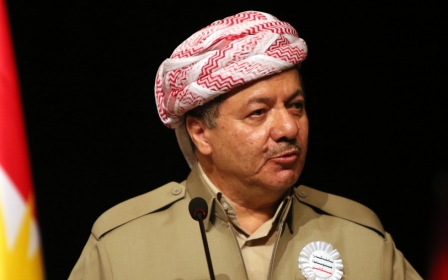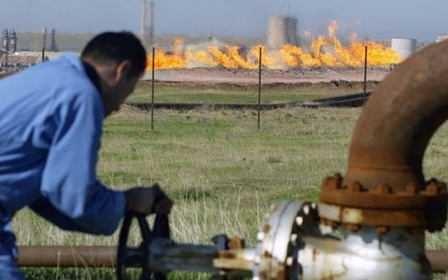The Turkish-Kurdish energy deal could pave way for Iraq’s breakup

When they signed an energy agreement in November 2013, the Turkish AKP (Justice and Development) government and the Kurdistan Regional Government (KRG) of Northern Iraq faced an important challenge.
Their deal to export the 45 billion barrels of oil lying in Iraqi Kurdistan via the Turkish port of Ceyhan was not only a risky cooperation initiative within a chaotic region but also lacked international recognition. Perceived as a fait accompli, the agreement was condemned by the central Baghdad government, declaring any sale without its approval as unconstitutional and this stance was also backed by the US government.
Furthermore, according to the agreement, the revenues would be deposited in the Turkish state-owned Halkbank which was under Washington´s spotlight for receiving payments in Turkish lira on behalf of Iranian energy exporters (The US-led sanctions then prevented Iran from being paid in euros or dollars and the Iranian exporters were buying gold with their Turkish money which they later sold it in Dubai in foreign currency). Shortly after the energy agreement was signed, Halkbank made international headlines when its manager was detained on 17 December for allegations of receiving bribes for organising illegal transfers to Iran.
With its aim and organisation, the energy deal seemed to be all but internationally illegitimate, and moreover was never welcomed by Turkey’s domestic opposition. It was never voted for by the parliament - as it is not a juridical document between two states; the PKK (the armed Kurdistan Workers Party) and its Kurdish political affiliates harshly condemned it and reproached the AKP and KRG for pursuing narrow economic interests.
An obscure yet functional cooperation
Instead of trying to persuade the interested parties and promote the deal’s international status, Ankara and Erbil pursued their cooperation in secrecy. The oil began to be shipped from Ceyhan on May 2014 without identification of its customers, only until international media reported the delivery of 1m barrels of oil to the Israeli port of Askhelon on 20 June. The involvement of Israel was a game changer, firstly due to Tel Aviv’s good relations with a reluctant Washington, who actually did not oppose the shipment, and more importantly due to the emergence of a concrete market perspective, which subsequently incited Erbil and Bagdad to sign the “2 December agreement”. According to this, KRG would receive 17 percent of the total revenues in exchange for 300,000 barrels of oil sale per day, and deliver an additional 250,000 barrels per day to the Iraqi State Organisation for the Marketing of Oil (SOMO).
Upon completion of a revenue distribution scheme between KRG and Baghdad, the Turkish-Kurdish energy deal seemed to enjoy increased international approval. However it still functioned ambiguously, mainly with regards to who purchased the oil in Ceyhan. What is certain until this day is that first-hand purchasers are particularly interested in the Israeli market, supplying 77 percent of its energy demands. According to an article by the Financial Times 19 million barrels of oil worth 1 billion dollars was transported to Israel during the last three months.
Both Ankara and Erbil insist that their intentions are all about business and refrain from giving any impression that they act as Israel’s energy partners. An official from the KRG conveyed recently that his government was not interested with the final destination but with receiving payments from first-hand purchasers, and such a profit-oriented attitude was legitimated by the urgent need to pay the local Peshmerga forces fighting against the Islamic State in Northern Iraq. From his side the Turkish Minister of Energy Taner Yildiz told the Turkish press last week that it was not Turkey but Iraq selling the oil to Israel, emphasising that the Turkish government was still aloof vis-à-vis Tel Aviv since the Mavi Marmara raid of 2010.
Energy dreams have no boundaries
The truth is, the Turkish-Kurdish energy deal operates quite peculiarly considering the regional context, involving two countries in conflict - Turkey and Israel - and an autonomous Kurdish region engaged in constructive relations with the AKP government, especially compared to Turkey’s domestic Kurdish factions. Beginning as an almost marginal agreement in 2013, the energy deal begins to more clearly serve both the AKP’s and KRG’s regional ambitions.
Mainly for the Turkish government, having a central role in delivering the oil and managing its revenues is an opportunity to amend its decreased regional profile in recent years. Above all, Israel’s involvement as a lucrative and stable market contributes to its aspiration to become the energy hub of the region. With a somehow obscure delivery scheme, the government also engages itself in an indirect energy relationship with Israel, which could usher in a more explicit and broader energy cooperation such as building a pipeline from Israel’s Leviathan field to Turkey. The odds for this may seem very limited within the current diplomatic crisis between the two countries. However, considering that Turkey already serves as an outlet for large amounts of the oil filling Israel’s energy needs, it would not be astonishing to see pragmatic solutions when it comes to economic interests.
Secondly, the AKP government exerts financial control over the whole supply chain and KRG’s revenues through Halkbank. Opportunely for the government, the international reputation of the bank has been improved after the Iranian nuclear deal, as business circles interested in Iran now refer to the bank due to its operational connections here. This is also a positive development for the KRG which previously had certain reservations vis-à-vis the bank. After the allegations against Halkbank’s manager, Erbil and Baghdad had jointly agreed on alternative payment methods, but acting together would mean that the KRG had to share control over the oil revenues.
Since July 2015, with Ankara’s approval, Erbil sells the oil independently with the motive that the payouts from Baghdad remained too short to finance its urgent needs, mainly its security against IS. Moreover, the deposit of oil revenues in its own Halkbank account allows the KRG to bypass Baghdad, which perceives Erbil’s attitude as “burning bridges”. According to Arez Abdullah, the chairman of the oil and gas committee of the Iraqi Parliament, the Erbil-Baghdad agreement is now void, marking the “beginning of Iraq’s disintegration”.
It would be premature to suggest that the current framework of the oil exports would mark KRG’s detachment from Bagdad and formation of a new Kurdish state, but such a scenario will certainly be whispered among Ankara’s political elite. Moreover, an independent Kurdish state in the region is something clearly supported by Tel Aviv, and AKP remarkably shares a similar posture by supporting Erbil’s unilateral oil sales.
As expressed last year by the AKP spokesman Huseyin Celik, the Turkish government would welcome an oil-rich independent Kurdish state serving its energy ambitions: “If Iraq is divided and it is inevitable, the KRG are our brothers. Unfortunately, the situation in Iraq is not good and it looks like it is going to be divided.”
Today it is becoming obvious that the AKP’s energy dreams could also have a role in this division of Iraq, whether this is really intended or unintended by the Turkish government.
- Ozan Serdaroglu has research experience on Turkey and the Eastern Mediterranean, with a focus on political and economic development, Euro-Med relations, conflict management, regional cooperation and energy issues.
The views expressed in this article belong to the author and do not necessarily reflect the editorial policy of Middle East Eye.
Photo: An Iraqi welder works at an oil refinery near the village of Taq Taq, in the autonomous Iraqi region of Kurdistan, on 31 May, 2009. (AFP)
Middle East Eye propose une couverture et une analyse indépendantes et incomparables du Moyen-Orient, de l’Afrique du Nord et d’autres régions du monde. Pour en savoir plus sur la reprise de ce contenu et les frais qui s’appliquent, veuillez remplir ce formulaire [en anglais]. Pour en savoir plus sur MEE, cliquez ici [en anglais].





